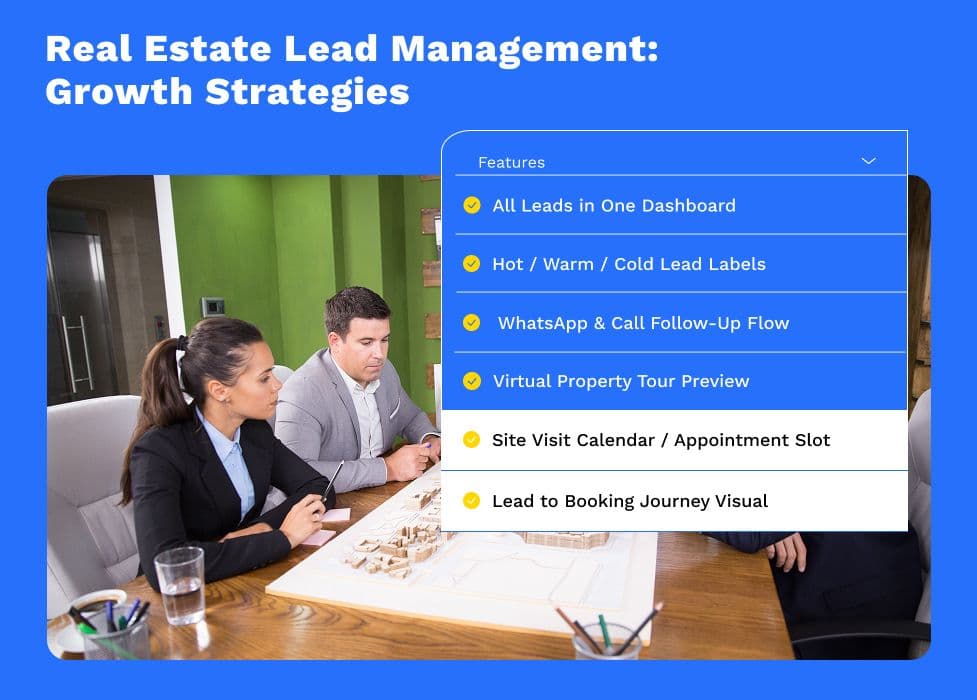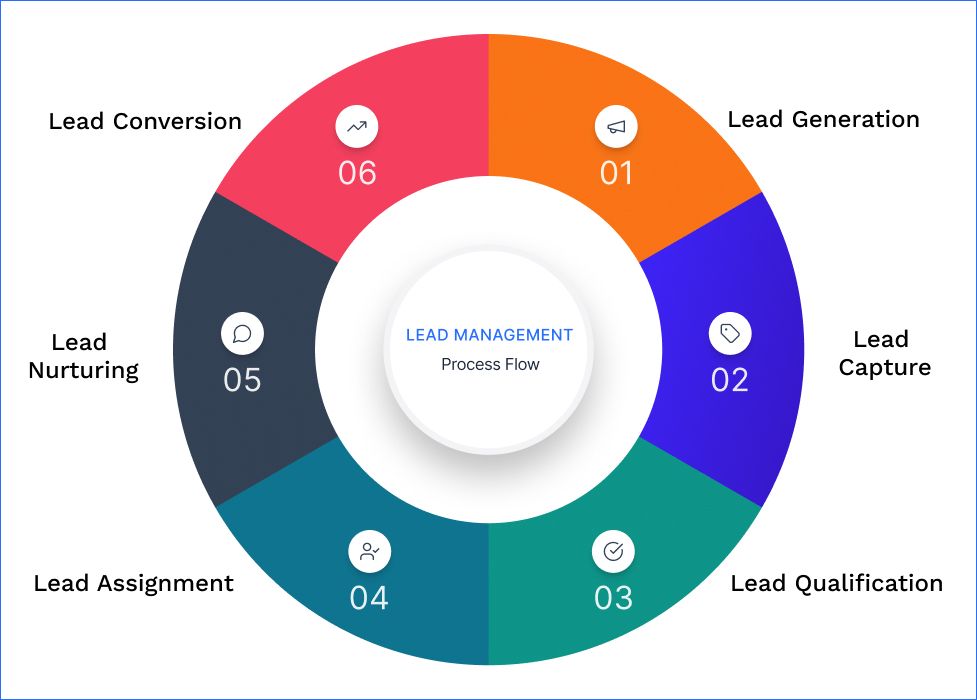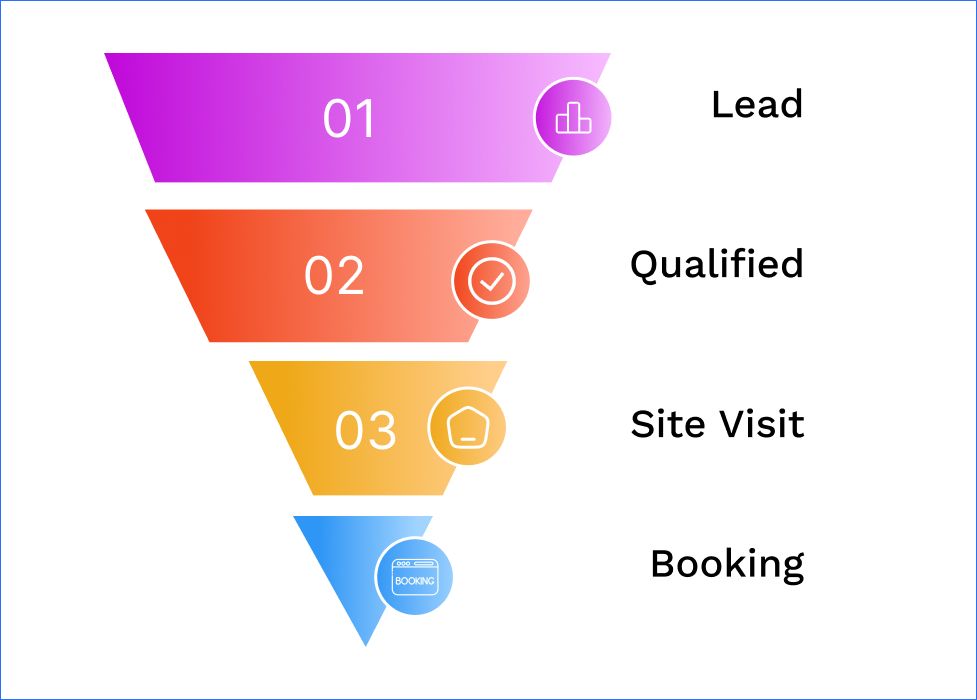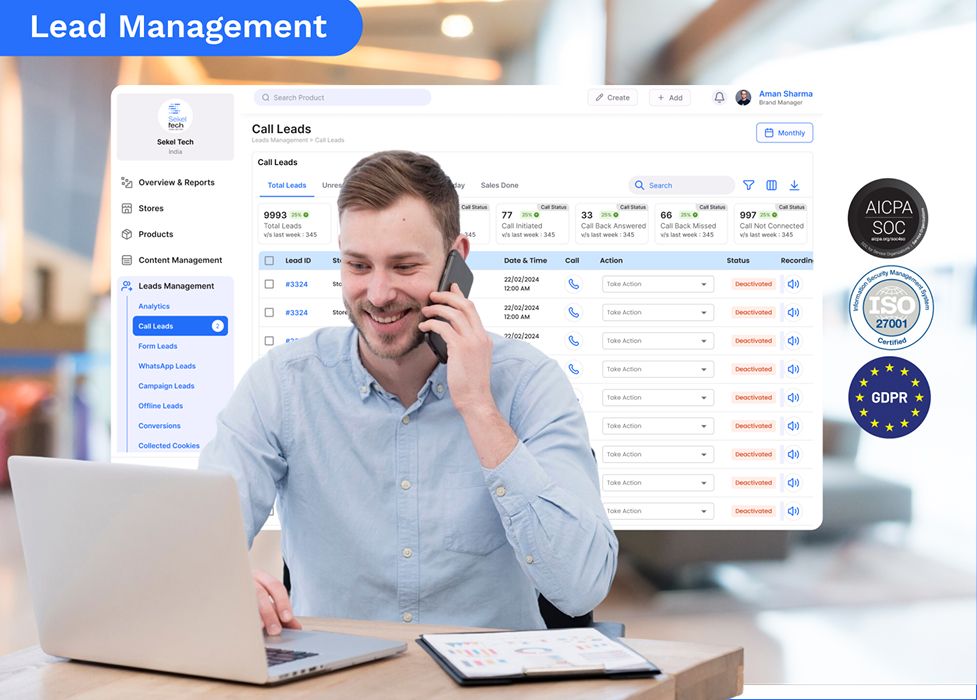Lead Management
Real Estate Lead Management: 10 Growth Strategies in 2025
Mon, 10 Nov 2025 13:06:48 GMT
Speak to our Hyperlocal Expert

Real estate lead management focuses on quality over quantity. Builders and brokers must respond faster, personalize follow-ups, and use smart STP automation to convert inquiries into site visits and bookings, improving overall conversion rates.
Real estate lead management has become a crucial differentiator for builders, developers, and channel partners. Today’s homebuyers don’t decide instantly. They explore multiple projects online and compare pricing, amenities, reviews, and even neighborhood maps before making the first call. This means your lead conversion depends not just on the project you sell, but how you engage the lead the moment they show interest.
Leads slip away when follow-ups are slow, conversations aren’t personalized, or sales teams don’t have a unified lead view. On the other hand, businesses that organize their lead pipeline, nurture prospects thoughtfully, and stay consistent across WhatsApp, calls, site visits, and CRM touchpoints see significantly higher conversions.
In this blog, we explore 10 practical strategies to improve lead quality, increase site visit rates, and convert more bookings with smart, customer-focused real estate lead management.
What is Real Estate Lead Management & Why It Matters

Real estate lead management is the organized process of capturing, tracking, qualifying, nurturing, and converting potential property buyers into site visits and bookings. It goes beyond just storing phone numbers in Excel sheets or CRMs. Effective lead management means understanding each buyer’s intent, budget, preferred location, family requirements, and readiness to purchase across touchpoints like Google Search, property listings, microsites, WhatsApp chats, phone calls, broker referrals, and walk-ins.
Real estate purchases are high-value and emotionally driven. Buyers compare multiple projects and only move forward when they feel informed, supported, and confident. If your follow-ups are slow, inconsistent, or generic, even strong leads can lose interest and choose a competitor who responds faster.
Strong lead management helps you:
- Identify serious buyers early
- Personalize conversations instead of pushing generic sales messages
- Increase site visit conversions through timely follow-ups
- Reduce lead leakage and missed opportunities
- Improve bookings without increasing marketing budgets
Simply put: Better lead management = More site visits + Higher bookings + Lower marketing wastage.
Read Also - Lead Management: Track & Analyse Call, Form, WhatsApp Leads
Stages of Real Estate Lead Management

A real estate sale progresses through multiple touchpoints. Managing each stage with clarity reduces lead leakage and improves conversions.
1. Lead Generation
This is where interest begins. Leads come from both online and offline channels:
- Online: Google Ads, Meta Ads, WhatsApp Click-to-Chat, landing pages, project websites, microsites
- Offline: Walk-ins, exhibitions, hoardings, broker networks, referrals
A balanced approach ensures both digital discovery and strong neighborhood presence.
2. Lead Capture & Tagging
Every inquiry must be captured instantly into one system. Leads should be tagged by:
- Source (Google, Walk-in, Referral, Broker)
- Project/location
- Budget / buying intent
This prevents confusion and gives visibility for follow-ups.
3. Lead Qualification
Qualification separates serious buyers from information seekers. Key factors:
Budget fit
- Location preference
- Purchase timeline
- Urgency level
This enables clear scoring (hot/warm/cold) for prioritization.
4. Lead Assignment
Qualified leads should be assigned based on:
- Geography/project cluster
- Sales rep expertise
- Availability / shift alignment
This ensures accountability right from the start.
5. Lead Nurturing & Follow-Ups
Consistency wins deals. Nurturing may include:
- WhatsApp interactions
- Email updates
- Brochures, walkthrough videos, virtual tours
Relevance and timing matter more than repeated pinging.
6. Lead Conversion & Post-Sale Engagement
The final stage moves from site visit to negotiation to booking to documentation. After booking, ongoing communication ensures a smooth onboarding and encourages referrals.
Want to see how businesses increase walk-ins and inquiries using local discovery? Watch this quick explainer video on boosting visibility and real-world footfalls: "How Retailers Boost Local Search Rankings & Foot Traffic?"
Common Challenges Real Estate & Home Builders Face
Most real estate businesses aren’t struggling to generate leads. The real challenge lies in converting them. Buyers today browse multiple projects, expect quick responses, and switch easily if they don’t feel guided or valued. Here’s where most builders, developers, brokers, and channel partners face roadblocks:
1. Getting the Right Leads - You receive inquiries, but only a few are genuinely interested or financially ready.
2. Strong Competition - Buyers compare you with similar projects in the same locality, making differentiation tough.
3. Hard to Get Found Online - Without consistent visibility across Google Search, Maps, websites, and listings, your project may not even enter the buyer’s shortlist.
4. Slow or Manual Processes - Lead follow-ups over Excel sheets, random calls, or scattered WhatsApp chats cause delays and missed opportunities.
5. Leads Don’t Convert - Lack of personalized nurturing results in drop-offs, even when the property is a good fit.
6. Technology Gap - Many teams are still not using automation, lead scoring, or centralized CRM systems to streamline workflows.
7. Compliance and Rules - Regulatory approvals, documentation, and RERA guidelines impact communication pace and clarity.
8. Data in Too Many Places - Client information is spread across multiple platforms, making tracking and accountability difficult.
9. Not Enough Market Insight - Sales teams often don’t know why customers lose interest or what they are comparing you against.
10. Need Better Project & Team Coordination - Site teams, sales staff, brokers, and marketing agencies don’t always share the same view of lead status, which leads to miscommunication.
Real Estate Lead Management Strategies in 2025
1. Unify All Lead Sources Into a Single Dashboard
A strong real estate lead management approach begins with centralization. Leads come from Google Ads, Meta campaigns, WhatsApp chats, walk-ins, broker networks, referrals, and listing platforms. When these inquiries are scattered across spreadsheets or individual phones, follow-ups slow down and accountability disappears. A unified dashboard brings every lead into one view, improving visibility and response tracking. This is one of the most reliable real estate lead management strategies for reducing leakage and boosting conversions.
2. Implement Automated Lead Tagging & Scoring (Hot/Warm/Cold)
Not all leads have the same urgency to buy. Automated tagging and scoring classify inquiries by budget, buying timeline, and engagement. This real estate lead management strategy ensures sales teams spend time where conversions are most likely. Hot leads get immediate calls, warm leads receive nurturing, and cold leads get light engagement. Smart scoring improves productivity and ensures serious buyers move quickly through the pipeline.
3. Respond to Every Lead Within 5 Minutes
Speed is your competitive edge. Fast follow-ups signal professionalism and trust, especially when buyers inquire about multiple properties. One key principle in real estate lead management strategies is to maintain a 5-minute response rule via call, WhatsApp, or SMS. Automated acknowledgment messages can help when the team is busy. Faster engagement leads to more scheduled site visits and stronger conversion momentum.
4. Use WhatsApp for Personalized Follow-Ups & Appointment Scheduling
WhatsApp is often the buyer’s most convenient communication channel. Use it to share brochures, videos, offers, and site visit times. Personalized follow-ups make your real estate lead management flow smooth and natural, rather than pushy or generic. The goal is to build a conversational relationship, which increases trust and improves conversion likelihood.
5. Provide Virtual Property Tours & Video Walkthroughs
Virtual tours and walkthrough videos help buyers visualize the property before they visit. They save time, filter out non-serious leads, and support NRI or out-of-city buyers. This has become a core part of modern real estate lead management strategies, helping shorten the decision-making cycle and increase emotional engagement.
6. Segment Leads Based on Budget, Location & Buying Stage
Segmentation ensures the buyer receives the right message at the right time. For example, one buyer may need pricing clarity while another may need neighborhood insights. Using segmentation within your real estate lead management workflow helps nurture relationships with relevance and authenticity. Personalized conversations build confidence, and confidence leads to bookings.
7. Align Marketing & Sales Teams With Shared Lead Statuses
One of the overlooked real estate lead management strategies is alignment. Marketing brings in leads; sales converts them. When both teams use a shared lead status workflow (New → Contacted → Site Visit → Negotiation → Booked), there is transparency and accountability. This reduces confusion and keeps conversions measurable and scalable.
8. Use First-Party Data for Accurate Re-targeting & Re-engagement
First-party data gathered through calls, forms, and chats provides high-quality insight into buyer behavior. Using this data to re-engage leads is more effective than broad targeting. It strengthens your overall real estate lead management framework by reducing advertising waste and improving conversion rates.
9. Analyze Lead Source ROI to Optimize Marketing Spend
Some channels generate volume, others generate value. Regularly compare CPL, qualification rate, site visit rate, and booking rate for each source. This helps refine real estate lead management strategies and ensures the budget is directed to where the highest-quality buyers come from.
10. Offer Loyalty, Referral & Existing Customer Upsell Programs
Satisfied buyers are your strongest influencers. Referral programs drive high-trust leads that convert quickly. Upselling existing customers looking for upgrades or investment options can also create repeat revenue. This relationship-driven approach strengthens real estate lead management and reduces dependence on expensive paid acquisition.
To understand how tracking, attribution, and follow-up strategies influence conversion, watch this short breakdown on how businesses track and convert high-intent leads effectively: "How to Track & Convert Quality Leads for Your Store."
How to Organize Real Estate Leads Effectively

When managing large volumes of inquiries, structuring your leads makes a huge difference in conversion outcomes. In real estate lead management, the first step is to categorize your leads based on their buying readiness. Sort them by temperature: Hot (ready to visit or buy soon), Warm (interested but evaluating), and Cold (long-term prospects). Next, qualify leads by budget range, location preference, and urgency. Also, tag every lead by source like Google Ads, walk-ins, brokers, WhatsApp chats, microsite forms, etc.
Store everything in a centralized CRM so your team can view lead history, interaction timelines, documents shared, and who is handling the conversation. Automated reminders and follow-up alerts ensure no genuine lead is forgotten, improving your lead-to-site-visit ratio significantly.
Real Estate CRM Lead Management Best Practices

A CRM isn’t just a database; it’s your conversion engine. Effective real estate lead management strategies rely on clarity and transparency. Make sure the sales team logs every call, site visit, conversation, and status update. This helps management track pipeline progress and identify gaps early.
Use the CRM to align sales and marketing teams: weekly dashboards, performance reports, and conversion funnel analysis (Lead → Qualified → Site Visit → Booking). When everyone follows a standard workflow and updates statuses consistently, decisions are faster, follow-ups are timely, and conversion rates significantly improve.
Read Also - 10 Best Omnilocal Lead Management Trends to Watch in 2025
Why Smart Lead Management Platforms Are Essential Today
Competition is rising, and customer expectations are higher than ever. Every prospect expects instant responses, clear information, and guided support. Meanwhile, the cost of acquiring leads keeps increasing. This makes an efficient real estate lead management strategy essential for profitability.
Smart lead management platforms give you one centralized source of truth, helping teams work in sync even if they operate across different cities or project sites. With first-party customer data becoming critical due to privacy regulations, such platforms help brands build deeper relationships without relying purely on paid ads. It’s not just about managing leads anymore; it’s about managing the entire customer journey from inquiry to loyalty.
Read Also - Best Lead Management Platform to Streamline Sales in 2025
Sekel Tech Real Estate Lead Management: Convert Every Lead into Sales

Sekel Tech empowers real estate developers, brokers, and channel partners to manage every inquiry with precision and speed. Instead of juggling leads from multiple platforms, Sekel brings them all into a single, centralized real estate lead management system. Powered by automated lead scoring and AI-driven insights, it ensures your team always focuses on the right buyers at the right time.
Key Capabilities -
1. Unified Lead Capture Across All Channels
Automatically collects leads from Google Ads, Meta forms, WhatsApp chats, microsites, walk-ins, and channel partner referrals, so no lead slips through the cracks.
2. AI-Based Hot/Warm/Cold Intent Scoring
Buyer intent is scored in real-time, helping your team prioritize those closer to booking while nurturing longer-cycle leads with steady follow-ups.
3. 360° Lead View & Complete Interaction History
Every call, message, document shared, note, visit reminder, and conversation stays in one place, enabling context-driven, meaningful communication.
4. One-Click Engagement
Call, WhatsApp, or message leads directly from the dashboard to reduce response time and increase appointment confirmations.
5. Campaign Attribution & ROI Tracking
See which channels, campaigns, project pages, or zones generate the highest-quality leads, helping you spend smarter.
Why Real Estate Teams Prefer Sekel Tech
- No leads get lost or ignored.
- Faster and more consistent follow-ups
- Clear responsibility and performance visibility
- Better site visit scheduling and confirmations
- Higher conversion from site visit to booking
Sekel Tech transforms real estate lead management from manual effort into a streamlined, data-driven sales engine that drives real revenue impact.
Real Estate Lead Management Strategy: Measuring Success
To improve conversions consistently, your real estate lead management strategy must rely on clear performance metrics. Tracking the right numbers helps you understand where leads are coming from, how quickly your team responds, and how effectively those leads move toward site visits and bookings. Here are the key metrics to monitor:
Metric | Why It Matters |
| Cost per Lead (CPL) | Shows how efficiently your marketing budget is being utilized. Lower CPL = better channel targeting. |
| Lead Response Time | The faster your team responds, the higher the chance of engaging the buyer before competitors. |
| Lead to Site Visit Ratio | Indicates how qualified your leads are and how effectively they are being nurtured. |
| Site Visit to Booking Ratio | Reflects sales performance and on-ground experience delivered at the property. |
| Source-Level ROI | Helps identify which marketing channels deliver the best results so you can scale what works and reduce waste. |
Strong real estate brands review these metrics weekly to keep teams aligned, improve follow-up workflows, and focus only on high-impact growth channels.
Frequently Asked Questions (FAQs)
1. What is Lead Management in Real Estate?
Real Estate Lead management is the process of attracting potential buyers, capturing their details, understanding their needs, and nurturing them until they’re ready to make a site visit or booking. It involves tracking conversations, sending timely follow-ups, sharing property information, and guiding the buyer throughout their decision journey. The goal is simple: turn interested inquiries into confident, committed customers.
2. What are the 4 P’s of Real Estate?
The 4 P’s of Real Estate Marketing are:
- Product: Your project or property itself: location, features, amenities.
- Price: The value and pricing strategy offered to the buyer.
- Place: Where and how the property is promoted and discovered (both online and offline).
- Promotion: The marketing activities used to create interest and generate leads.
Understanding these helps real estate brands position their properties effectively and stand out in a competitive market.
3. How do you organize real estate leads effectively?
To stay in control of your pipeline, categorize leads based on urgency (hot, warm, or cold), buyer budget, and interest level. Store all lead information in a CRM so your team doesn’t rely on scattered notes or manual tracking. Automated reminders and follow-up notifications help ensure no lead is forgotten. The more structured your system, the more smoothly inquiries turn into site visits and bookings.
4. How to increase real estate leads?
You can attract more real estate leads by combining digital visibility with personal outreach. Use Google and Meta Ads to capture active homebuyers, optimize your website and microsite for inquiries, and stay active on WhatsApp and social platforms. At the same time, build trust networks with channel partners, brokers, and referral groups. Strong brand visibility and consistent follow-ups equal steady lead flow.
5. How can you attract more leads for a property or project?
Focus on making it easy for people to find and contact you. Share helpful content, highlight project benefits, answer questions quickly, and provide virtual tours. Run targeted campaigns around location-based audiences and ensure WhatsApp click-to-chat is active. Also build referral and loyalty programs because satisfied buyers often bring new buyers.
Conclusion
Effective real estate lead management is no longer just about collecting inquiries. It’s about qualifying the right prospects, responding quickly, nurturing trust, and guiding each buyer confidently from interest to site visit and finally to booking. When your lead pipeline is organized, your team aligned, and your follow-ups consistent, conversion rates naturally increase. By adopting the right real estate lead management strategies, developers and brokers can reduce lead leakage, improve ROI, and build stronger customer relationships. If you're ready to streamline your lead pipeline and convert more inquiries into confirmed bookings, Sekel Tech can help. Book a calendar for a quick call and see how you can centralize leads, automate follow-ups, and accelerate sales success.
Share
Similar Blogs
Loved this content?
Sign up for our newsletter and get the latest tips & updates directly in your inbox.
There’s more where that came from!